Related Research Articles

The Beach Boys are an American rock band that formed in Hawthorne, California, in 1961. The group's original lineup consisted of brothers Brian, Dennis, and Carl Wilson, their cousin Mike Love, and friend Al Jardine. Distinguished by their vocal harmonies, adolescent-themed lyrics, and musical ingenuity, they are one of the most influential acts of the rock era. They drew on the music of older pop vocal groups, 1950s rock and roll, and black R&B to create their unique sound. Under Brian's direction, they often incorporated classical or jazz elements and unconventional recording techniques in innovative ways.
Art rock is a subgenre of rock music that generally reflects a challenging or avant-garde approach to rock, or which makes use of modernist, experimental, or unconventional elements. Art rock aspires to elevate rock from entertainment to an artistic statement, opting for a more experimental and conceptual outlook on music. Influences may be drawn from genres such as experimental music, avant-garde music, classical music, and jazz.
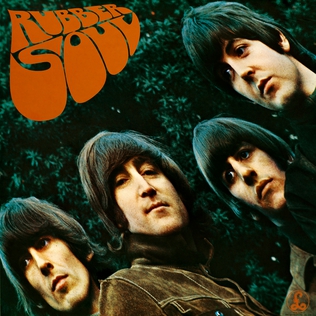
Rubber Soul is the sixth studio album by the English rock band the Beatles. It was released on 3 December 1965 in the United Kingdom, on EMI's Parlophone label, accompanied by the non-album double A-side single "Day Tripper" / "We Can Work It Out". The original North American release, issued by Capitol Records, contains ten of the fourteen songs and two tracks withheld from the band's Help! album. Rubber Soul was met with a highly favourable critical response and topped sales charts in Britain and the United States for several weeks.

Paul Stanley is an American musician and singer who is the co-founder, frontman, rhythm guitarist and co-lead vocalist of the rock band Kiss. He is the writer or co-writer of many of the band's most popular songs. Stanley established The Starchild character for his Kiss persona. Stanley was inducted into the Rock and Roll Hall of Fame in 2014 as a member of Kiss.
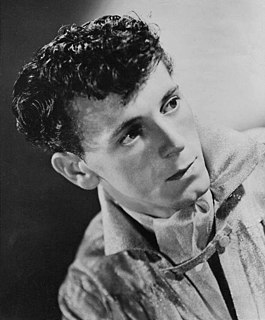
Vincent Eugene Craddock, known as Gene Vincent, was an American musician who pioneered the styles of rock and roll and rockabilly. His 1956 top ten hit with his Blue Caps, "Be-Bop-a-Lula", is considered a significant early example of rockabilly. He was inducted into the Rock and Roll Hall of Fame and the Rockabilly Hall of Fame. He is sometimes referred to by his somewhat unusual nickname/moniker the "Screaming End".

James Witherspoon was an American jump blues singer.

Wild Honey is the 13th studio album by American rock band the Beach Boys, released December 18, 1967 on Capitol Records. It was the group's first foray into soul music and was heavily influenced by the R&B of artists such as Stevie Wonder. The album was the band's worst-selling at that point, charting at number 24 in the US. Lead single "Wild Honey" peaked at number 31, while its follow-up "Darlin'" reached number 19. In the UK, the album peaked at number seven.

Gene Chandler is an American singer, songwriter, music producer, and record-label executive. Chandler is nicknamed "the Duke of Earl" or, simply, "the Duke." He is best known for his most successful songs, "Duke of Earl" and "Groovy Situation", and his association with the Dukays, the Impressions, and Curtis Mayfield.
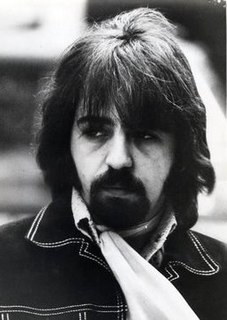
Clarence White was an American bluegrass and country guitarist and singer. He is best known as a member of the bluegrass ensemble the Kentucky Colonels and the rock band the Byrds, as well as for being a pioneer of the musical genre of country rock during the late 1960s.
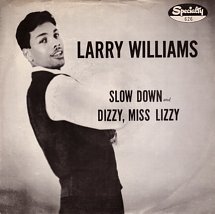
"Slow Down" is a rock and roll song written and performed by Larry Williams. Recorded in 1957, AllMusic writer Stewart Mason describes it as "raucous enough to be punk rock nearly a full two decades before the concept was even in existence." Specialty Records released it as a single in 1958, but only the second-side "Dizzy, Miss Lizzy" reached the record charts. Both songs were later covered by the Beatles.

"Dizzy, Miss Lizzy" is a rock and roll song written and recorded by Larry Williams in 1958. Although identified as a "genuine rock & roll classic", it had limited success on the record charts. Seven years later, the Beatles recorded the song, and John Lennon performed it with the Plastic Ono Band in 1969.

"Bad Boy" is a song written and recorded by American R&B musician Larry Williams. Specialty Records released it as a single in 1958, but it failed to reach the U.S. Billboard charts. However, music journalist Stephen Thomas Erlewine calls it one of Williams's "genuine rock & roll classics" and notes its popularity among 1960s British Invasion groups, such as the Beatles.

Count Five was an American garage rock band, formed in San Jose, California in 1964, known for their hit single "Psychotic Reaction".

Moby Grape is the 1967 debut album by rock band Moby Grape. Coming from the San Francisco scene, their reputation quickly grew to immense proportions, leading to a bidding war and a contract with Columbia Records. The album peaked at #24 on the Billboard 200 albums chart in September 1967.
"Let the Wind Blow" is a song written by Brian Wilson and Mike Love for American rock band the Beach Boys. It was released in 1967 as the ninth track on their thirteenth studio album Wild Honey. The song is a ballad with lyrics that metaphorically relate nature to the essence of love. It is the first composition recorded by the group that is in 3
4 time from beginning to end.
Frederick Eugene John Lees was a Canadian music critic, biographer, lyricist, and journalist. Lees worked as a newspaper journalist in his native Canada before moving to the United States, where he was a music critic and lyricist. His lyrics for Antonio Carlos Jobim's "Corcovado", have been recorded by such singers as Frank Sinatra, Peggy Lee, Queen Latifah, and Diana Krall.
Chris Charlesworth is a British-based music journalist and author; and, between 1983 and 2016, managing editor of Omnibus Press. He is particularly noted for his work about, and with, The Who, for whom he has worked as an executive producer. Charlesworth also worked as David Bowie's publicist at RCA Records from 1979 to 1981.

Zoo World was an American bi-weekly rock music magazine that operated between 1971 and 1975. Available throughout the United States, it was published in Fort Lauderdale, Florida and intended as a rival to Rolling Stone. In early issues of the magazine, the cover carried a subtitle reading: "The Music Megapaper".
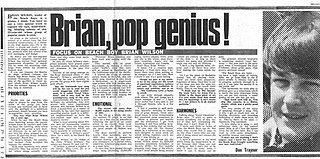
"Brian Wilson is a genius" is a line that became part of a media campaign spearheaded in 1966 by the Beatles' former press officer Derek Taylor, who was then employed as the Beach Boys' publicist. Although there are earlier documented expressions of the statement, Taylor frequently called Brian Wilson a "genius" as part of an effort to rebrand the Beach Boys and legitimize Wilson as a serious artist on par with the Beatles and Bob Dylan.
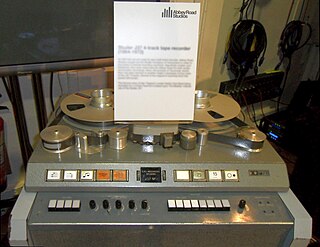
In music production, the recording studio is often treated as a musical instrument when it plays a significant role in the composition of music. Sometimes called "playing the studio", the approach is typically embodied by artists or producers who favor the creative use of studio technology in record production, as opposed to simply documenting live performances in studio. Techniques include the incorporation of non-musical sounds, overdubbing, tape edits, sound synthesis, audio signal processing, and combining segmented performances (takes) into a unified whole.
References
- ↑ "Eugene Paul Sculatti, Born 01/30/1947 in California". CaliforniaBirthIndex.org.
- ↑ "THE MAJESTIC WEST SCROLLGene Sculatti — Wimpole Street Writers". Wimpolestreetwriters.com. Retrieved July 7, 2017.
- ↑ Henderson, Richard (2010). Van Dyke Parks' Song Cycle. Bloomsbury Publishing. p. 6. ISBN 978-1-4411-4315-0.
- ↑ Frank, Thomas C. (1997). Baffler: The Journal That Blunts the Cutting Edge. Baffler. p. 194. ISBN 978-1-888984-09-5.
- ↑ "Gene Sculatti". Rock's Backpages . n.d.
- ↑ Fenterstock, Alison (July 22, 2015). "Dr. John's '60s, '70s Atlantic singles collected in new compilation, due out Sept. 18". Nola.com.
- ↑ O'Rourke, Sally (November 10, 2016). "BOOK: Gene Sculatti, 'Tryin' to Tell a Stranger 'Bout Rock and Roll: Selected Writings, 1966-2016'". Rebeat.